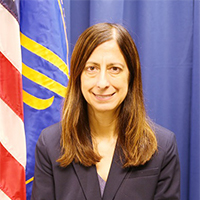Today I provided testimony on the IHS budget to the United States Senate Committees on Indian Affairs and on Appropriations: Interior, Environment, and Related Agencies Subcommittee.
I have only been in my job as Principal Deputy Director for a little over a week. Although I have been at the agency for a short time - I served for approximately five months in the role of Deputy Director - it has become quite clear to me that, while the IHS is firmly committed to the mission of providing quality health care for American Indians and Alaska Natives, we face steep operational and quality of care challenges.
This is unacceptable.
I want to underscore my commitment to fixing these challenges, including those in the Great Plains and the more systemic issues that we face as an agency such as staffing and housing. We are committed to fixing these issues not simply in the short-term but so that the changes are sustainable over time. I and the rest of the team at IHS am committed to creating a culture of quality, leadership, and accountability.
It is far from "business as usual" at IHS.
The annual budget request of the Indian Health Service is the result of a budget formulation and consultation process that involves IHS and Tribal Indian health program representatives and providers from the local to the national level. This year, as in previous years, quality health care, behavioral health and contract support costs have been prominent on the agenda and in the final budget request.
The first priority for IHS is, of course, the patients we serve. The health, well-being and safety of patients should be - and is - our paramount priority. IHS is focused on a long-term, comprehensive approach to ensure the safe delivery of care for all patients.
The renewed focus on direct health care services comes at a crucial time for the agency's Great Plains Area. IHS is taking a number of actions, both in the short- and the long-term, to address these issues. The federal response includes deployment of needed staff from other IHS Areas and HHS operating divisions; strategies for long-term recruitment and retention of clinical staff; efforts by our IHS Quality Consortium and the HHS Executive Council on Quality; and training for personnel in the Great Plains Area.
Another of my top priorities is the need to address the behavioral health issues affecting American Indians and Alaska Natives. IHS is working with its partners at HHS, across the federal government and with Tribes to combat the epidemic of Native suicides and the enormous costs of alcohol and drug abuse in our communities.
As was announced last month, the proposed IHS budget for fiscal year 2017, including projected third-party collections, is $6.6 billion. If enacted, this budget for IHS would represent a $402 million increase over fiscal year 2016. These funds will enable us to recruit, hire and retain more behavioral health professionals in order to create long term-support and provide stability.
Over 60 percent of the IHS budget is operated by tribes with authority provided by the Indian Self-Determination and Education Assistance Act, under which tribes may assume the administration of programs and functions previously carried out by the federal government. The proposed fiscal year 2017 budget fully funds estimated contract support costs at $800 million, an increase of $82 million above fiscal year 2016. This continues the policy to fully fund contract support costs and guarantees reliability of funding for the activities covered by contract support costs under the statute.
You have my commitment that we will work tirelessly to make meaningful, measurable progress. We have a lot of work to do together, and so I hope you join me in gearing up for a busy and productive year and beyond. Together, we have an incredible opportunity to improve health care for Native Americans.
Ms. Smith, a member of the Cherokee Nation, leads IHS, a nationwide health care delivery program responsible for providing preventive, curative and community health care to approximately 2.2 million American Indians and Alaska Natives. Read more



